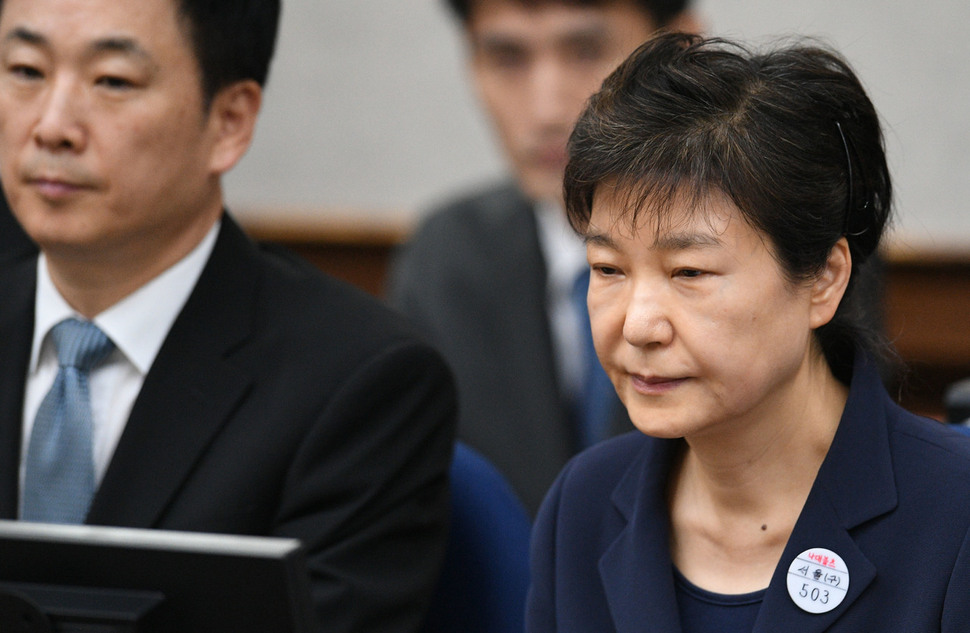 |
|
Former President Park Geun-hye attends the first stage of her trial on corruption and bribery charges on May 23. (Photo Pool)
|
The former president has refused to appear in court or meet with her state-appointed defense team
The presiding judge in Park Geun-hye’s corruption and bribery trial announced on Nov. 28 that the former president would be tried in absentia. Hon. Kim Se-yoon made the decision after Park refused to show up for a second day following the resumption of her trial after a 42 day hiatus on Nov. 27. In October, the former president’s legal team had resigned en masse and Park herself had declared that she would “boycott” the trial, which led to a lengthy halt of the proceedings. On Nov. 27, Hon. Kim had warned that Park could be tried in absentia regardless of whether she appeared, and the judge followed through on this threat the following day. ■ Court: “Not legitimate grounds for absence” The 22nd criminal division of Seoul Central District Court presided by Hon. Kim resumed trial proceedings for Park at 10 am on Nov. 27, but the hearing ended after 23 minutes due to the defendant’s absence. “[Park] submitted grounds for absence claiming she could not attend this morning due to health issues,” Hon. Kim said. “According to the report sent by the detention center, [Park] is observing the progress of her back pain, taking prescription painkillers for edema in her knees, and engaging in outdoor exercise for around 30 minutes a day,” he explained. “[The detention center] reported that [Park] had made it clear she did not plan to attend and expressed that it would be extremely difficult for it to forcibly escort her on account of her being a former president,” he added. Hon. Kim then inquired whether there were any opinions on proceeding with the trial in Park’s absence. Neither prosecutors nor Park’s legal team offered any opinion in response. Returning to the courtroom after a recess from 10:06 to 10:20 am, Hon. Kim said, “The defendant Park Geun-hye merely submitted grounds for absence and did not attend even after receiving a summons, and based on the detention center’s report she does not appear to have legitimate grounds [for absence].” “We may proceed with the trial [in Park’s absence] if she refuses to appear, and if she continues to refuse after having it explained to her that doing so may be prejudicial to her exercise of self-defense rights, the appropriate thing would be for [the court] to reach an agreement that time on whether to proceed with the trial,” he continued. Hon. Kim went on to say that if Park did not appear at the hearing at 10 am on Nov. 28, the court would make a decision then on whether to proceed with a trial in absentia. On Oct. 16, Park declared in court that she would be boycotting the trial proceedings. “I have reached the conclusion that any faith that the court will conduct a trial purely in accordance with the Constitution and conscience in spite of political and public opinion pressures is meaningless,” she said at the time. With health issues less of a factor that her declaration of a “political battle” from behind bars, Park is seen as unlikely to appear in court in the future. In contrast, the court’s immediate move to appoint five public defenders after Park’s legal team quit en masse – along with the first-trial sentencing for her accomplices, including a hearing with Choi Soon-sil alone on Samsung bribery allegations – suggest the trial is likely to go ahead in absentia.
 |
|
Members of Park Geun-hye’s state-appointed legal team: (from left) Cho Hyeon-gwon, 62 (15th Judicial Research and Training Institute class); Nam Hyeon-woo, 46 (34th); Kang Cheol-gu, 47 (37th); Kim Hye-yeong, 39 (37th); and Park Seung-gil, 43 (39th). (Yonhap News)
|







